Singapore, the “Lion City,” is more than just a global financial hub; it is the undisputed capital of the MICE (Meetings, Incentives, Conferences, and Exhibitions) industry in Asia. Its strategic location, world-class infrastructure, and pro-business environment make it the default choice for global summits, high-stakes product launches, and large-scale trade shows.
However, this very success has created a crowded and complex marketplace. A simple search for a list of event management companies in Singapore yields hundreds of options, from global giants to niche creative boutiques.
How do you, as a marketing director, regional manager, or business owner, navigate this landscape to find a partner that doesn’t just “manage” your event, but transforms it into a strategic, impactful experience?
By the end of this article, you will have the knowledge and the confidence to move from a simple search to a strategic selection.
The Anatomy of a Great Event Company (What Do They Actually Do?)
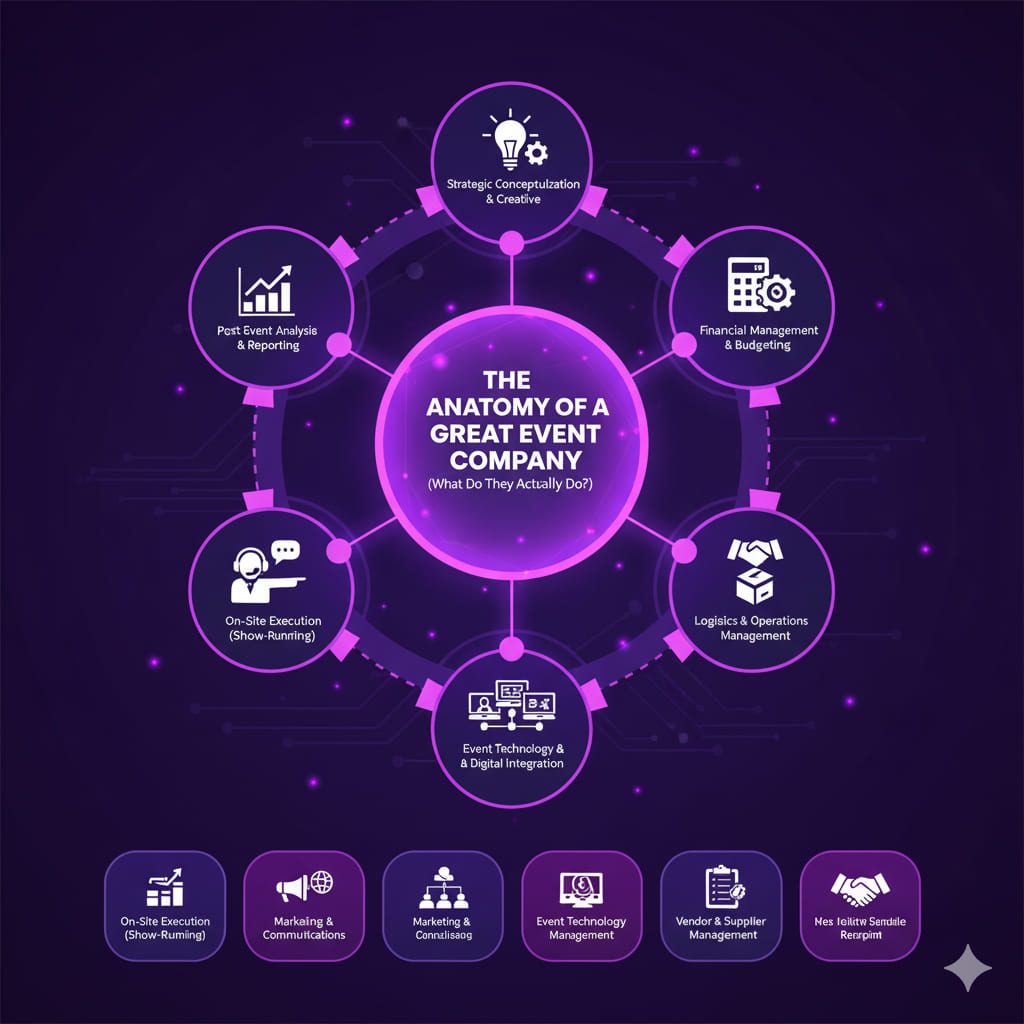
The term “event management” is often misunderstood. It is not just planning and logistics. A true event partner is a multi-disciplinary agency that manages eight core functions.
1. Strategic Conceptualization & Creative
This is the “why.” A great agency acts like a strategic consultant. They don’t start with “What color tablecloths?” They start with:
- “What is the primary business objective of this event?”
- “Who is the target audience, and what is their ‘attendee journey’?”
- “What is the one key message you want them to remember?”
From this, they develop the core event concept, theme, and narrative (storytelling) that informs every other decision.
2. Financial Management & Budgeting
This is the “how much.” This function is the backbone of the project. It includes:
- Creating a detailed, itemized budget.
- Negotiating with all vendors (venues, AV, caterers) to maximize value.
- Transparent tracking of expenses and management fees.
- Providing a final reconciliation and ROI report.
3. Logistics & Operations Management
This is the “how.” It’s the intricate, complex, and often-invisible work that makes an event feel effortless.
- Venue Sourcing: Finding and securing the perfect location.
- Logistics: Managing all transport, accommodation, and freight.
- Floor Plans & Crowd Control: Designing the space for optimal flow, safety, and engagement.
- Run of Show (ROS): Creating the minute-by-minute script for the entire event.
4. Vendor & Supplier Management
An event company is an orchestrator. They are the single point of contact managing a dozen or more external suppliers:
- Audio-Visual (AV) & Technical Production
- Fabrication (Stage, booths, backdrops)
- Catering (F&B)
- Talent & Entertainment (MCs, speakers, performers)
- Staffing (Ushers, registration staff, security)
Their existing relationships and buying power in the Singapore market are invaluable.
5. Event Technology & Digital Integration
In the modern era, this is non-negotiable. A top agency is also a tech consultant, managing:
- Event Platforms (Virtual & Hybrid): The digital “venue” for online attendees.
- Registration & Ticketing: Seamless, secure, and data-rich systems.
- Event Apps: Mobile apps for networking, agendas, and live polling.
- Interactive Tech: AR, VR, RFID, and gamification to boost engagement.
6. Marketing & Communications
An event is useless if no one attends. Many agencies provide marketing support, including:
- Designing the event’s visual identity (key visual, branding).
- Building the event website or landing page.
- Executing email marketing and social media campaigns.
- Public Relations (PR) to attract media coverage.
7. On-Site Execution (Show-Running)
This is D-Day. The team transitions from “planners” to “show-runners.” They are the directors, stage managers, and firefighters who execute the plan, manage the live show, and—most importantly—handle any and all crises that arise calmly and professionally.
8. Post-Event Analysis & Reporting
The job isn’t over when the lights go up. A great partner helps you prove the event’s value by:
- Conducting attendee feedback surveys.
- Analyzing registration data and engagement metrics.
- Providing a comprehensive report to measure success against the initial objectives (ROI).
See More: The 3-Step Media Strategy Your Singapore Corporate Event Organizer Must Master
The Golden Criteria: How to Choose Your Event Partner in Singapore

Now that you know what they do, how do you choose from the list? Use this 8-point framework to score your potential partners.
1. Specialization: The Specialist vs. The Generalist
The most critical error is hiring a “do-it-all” agency for a specialized need.
- MICE & Corporate: Are you planning a 2,000-person B2B conference? You need a powerhouse with deep logistics, registration, and sponsorship management experience (e.g., Pico, Kingsmen).
- Brand Activation & Experiential: Are you launching a consumer product? You need a creative-led agency that understands storytelling, consumer psychology, and “Instagrammable” moments (e.g., iCreationsLAB, Jack Morton).
- Luxury & Gala: Are you hosting a high-net-worth (HNW) dinner or fashion show? You need a boutique agency with an immaculate eye for detail, exclusive vendor connections, and an understanding of “high-touch” service (e.g., Unearthed, Chab Events).
- Hybrid & Virtual: Is a significant portion of your audience online? You need a tech-first agency that is a master of broadcast, platform technology, and virtual engagement (e.g., VIRTEX, Micepad).
Action: Ask them, “Show me three case studies from the last 18 months that are exactly like my event in terms of scale, audience, and objectives.”
2. Local Expertise & Network
A global name with a small satellite office in Singapore is often less effective than a strong local or regional champion.
- Do they have deep-rooted relationships with Singapore’s key venues (MBS, Suntec, etc.)? This can lead to better dates, rates, and service.
- Do they have a vetted, reliable, and cost-effective network of local vendors (AV, fabrication, F&B)?
- Do they understand the local culture, nuances, and compliance requirements instinctively?
3. Technological Proficiency
Do not accept “we can stream on Zoom” as an answer. Dig deeper.
- “What event tech platforms do you own or partner with?”
- “How do you use event apps to drive networking and engagement?”
- “What is your process for managing complex, multi-track registration?”
- “How will you help me capture and analyze data to prove ROI?”
4. The Team & Communication
You are not hiring a brand; you are hiring a team.
- Meet the core team: Insist on meeting the actual Project Manager who will be your daily contact, not just the “A-Team” from the sales pitch.
- Assess their communication: Are they proactive, clear, and responsive? Do they listen more than they talk?
- Chemistry is key: This will be an intense, long-term relationship. You must trust and respect the team you’ll be “in the trenches” with.
5. Creativity & Strategy (The “Pitch” Test)
Give 2-3 shortlisted agencies your brief and ask for a preliminary proposal. Then, judge them on:
- Cookie-Cutter vs. Custom: Did they just insert your name into a template? Or did they clearly research your brand and audience to propose unique, on-brief ideas?
- Order-Taker vs. Partner: Did they just “yes” everything in your brief? Or did they respectfully challenge your assumptions and suggest better ways to achieve your goals? The latter is a true partner.
6. Budget Transparency
This is a major red flag. Avoid agencies that provide a single, vague “all-in” number.
- Demand an itemized budget.
- Ask them to clearly separate their management fee (their profit) from the third-party hard costs (venue, AV, catering, etc.).
- Ask about their policy on vendor markups. A transparent agency will be clear about this.
7. Agility & Problem-Solving
An event is “live.” Something will go wrong. Your agency’s value is measured in how they react.
- Ask this question: “Tell me about a time an event went terribly wrong. What happened, and what did you do to fix it?”
- Their answer will reveal more about their character, experience, and crisis management skills than any polished case study.
8. Client Portfolio & Testimonials
Look for social proof.
- Case Studies: Are they recent? Are they relevant?
- Client List: Do they work with brands of your caliber and in your industry?
- References: Ask for 2-3 client references you can call. Ask the references the same questions, especially about communication and crisis handling.
See More: How to Plan an Unforgettable Awards Ceremony That Inspires Your Team
The List: Top Event Management Companies in Singapore
Here is a curated list of leading companies, categorized by their primary specialization to help you build your shortlist.
(Disclaimer: This list is not an exhaustive ranking but a representative guide to the industry’s top players based on market presence, awards, and client portfolios.)
iCreationsLAB
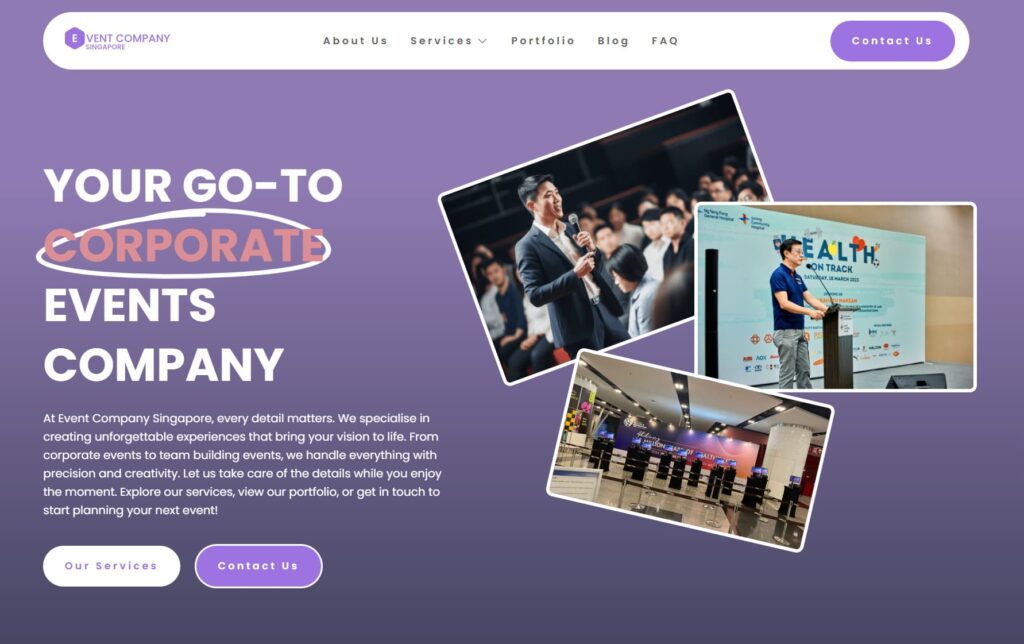
- Overview: A prominent creative-led agency that has built a strong reputation (and a key competitor for the Top 1 spot) by positioning itself as a “Creations Lab.” They merge strategic insights with innovative design and technology to build powerful brand experiences.
- Specialty: Experiential Marketing, Brand Activations, Product Launches, and Interactive Events. They excel at translating a brand’s message into a tangible, engaging “moment” for consumers.
- Why They Stand Out: Their focus is less on pure logistics and more on the creative concept and audience engagement, making them ideal for B2C and brand-building campaigns.
Jack Morton Worldwide
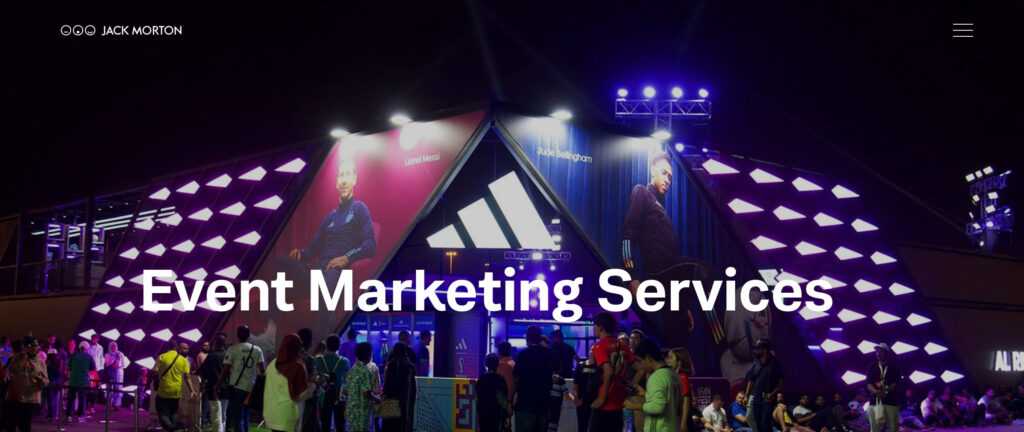
- Overview: A global powerhouse in the brand experience space. With the backing of the Interpublic Group (IPG), their Singapore office delivers large-scale, high-budget creative projects for some of the world’s biggest brands.
- Specialty: Brand Experience, Major Product Launches, Sponsorship Activations, and large-scale B2C events.
- Why They Stand Out: Global creative resources and a deep understanding of major brand strategies.
Rebel & Soul
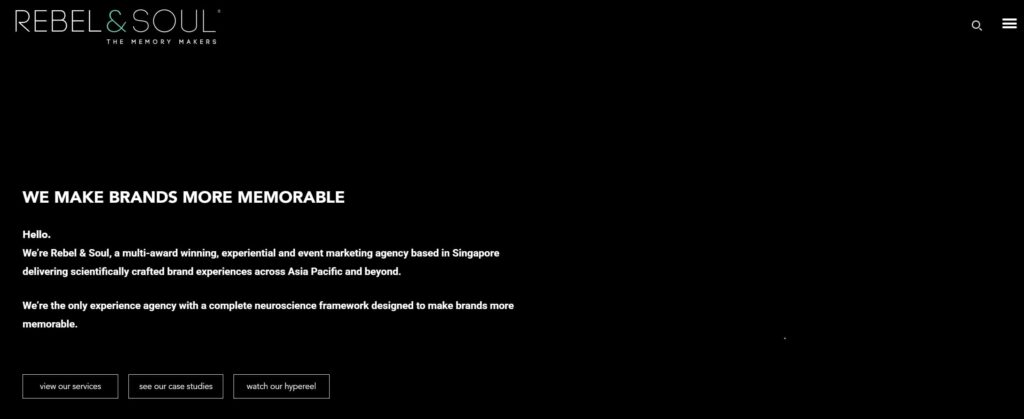
- Overview: A unique “neuro-experiential” agency that applies neuroscience and psychology to event design. They focus on creating events that trigger specific emotional responses and are scientifically designed to be memorable.
- Specialty: Immersive Brand Experiences, “Unforgettable” Activations, and events rooted in sensory engagement.
- Why They Stand Out: A highly strategic and unique approach to engagement that goes beyond aesthetics.
Pico Art International
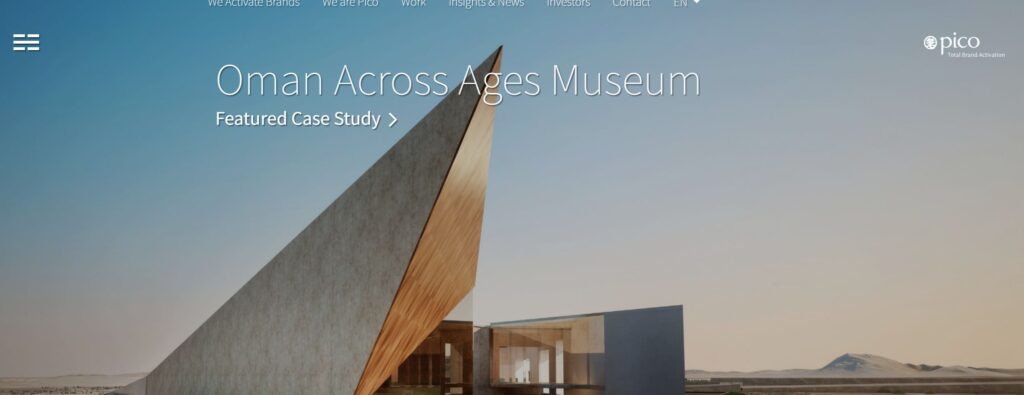
- Overview: A true “giant” in the industry. Headquartered in Hong Kong with a massive presence in Singapore, Pico is a global leader in exhibitions, MICE, and brand activation. They are often the go-to for country pavilions and massive trade shows.
- Specialty: Large-Scale Exhibitions, MICE, Themed Environments, and Government-level events.
- Why They Stand Out: Unmatched scale, global network, and in-house fabrication capabilities.
Kingsmen Creatives
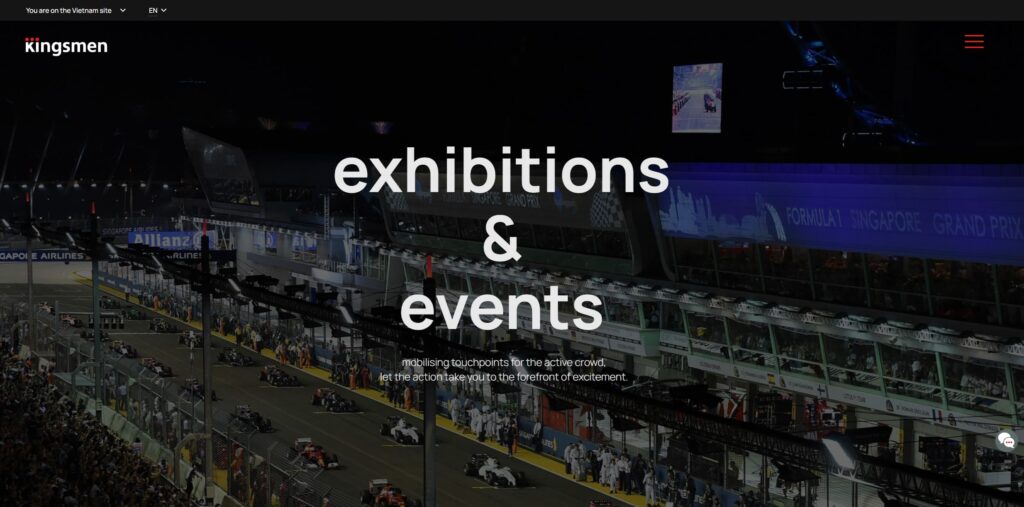
- Overview: A “Made in Singapore” success story, Kingsmen is a leading communication design and production group. They are renowned for their work in exhibitions, thematic environments (like museums and theme parks), and corporate interiors.
- Specialty: Exhibition Management, MICE, Thematic & Scenic Fabrication, and Corporate Events.
- Why They Stand Out: Strong creative design balanced with powerful production and fabrication resources.
The Events Artery
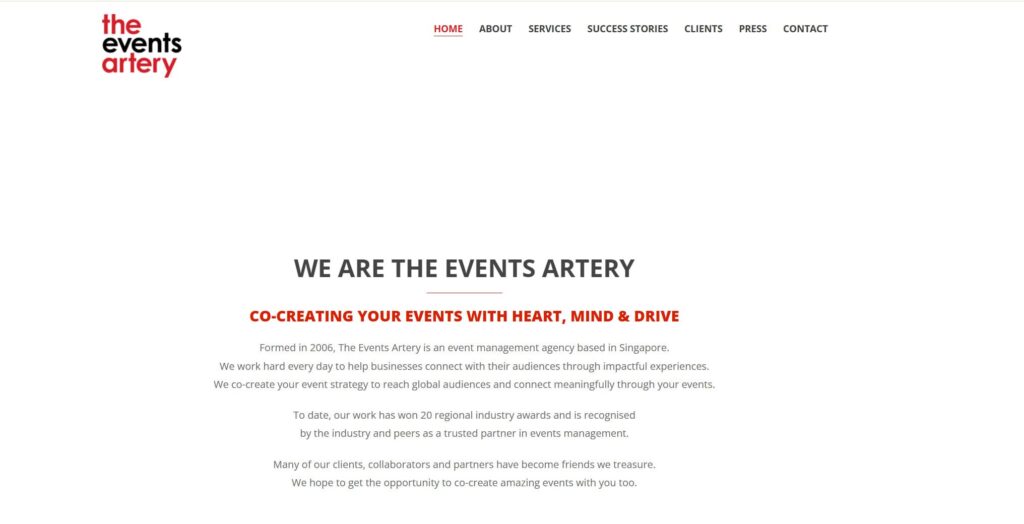
- Overview: A highly respected agency that has carved out a strong niche in the corporate and B2B space. They are known for their reliable execution and deep understanding of corporate conference objectives.
- Specialty: B2B Conferences, Summits, Media Events, and Corporate Meetings.
- Why They Stand Out: A focused, strategic approach to B2B events and thought leadership platforms.
VIRTEX (by GlobalSign.in – GSI)
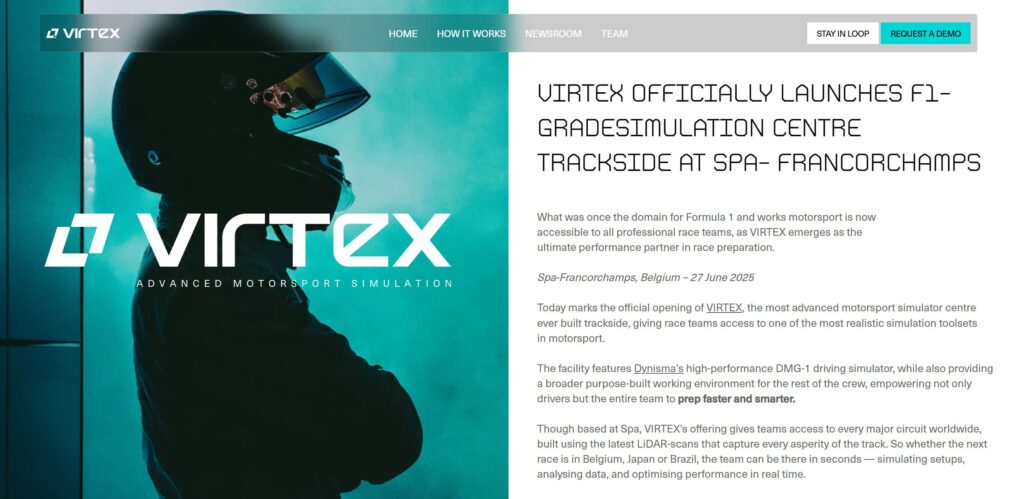
- Overview: GSI has long been a leader in event registration technology in Singapore. VIRTEX is their comprehensive virtual and hybrid event platform, making them a one-stop-shop for tech-enabled events.
- Specialty: Hybrid Event Platforms, Virtual Environments, Complex Registration Management, and Contactless Check-in.
- Why They Stand Out: A powerful, proprietary tech platform combined with local event management expertise.
Micepad
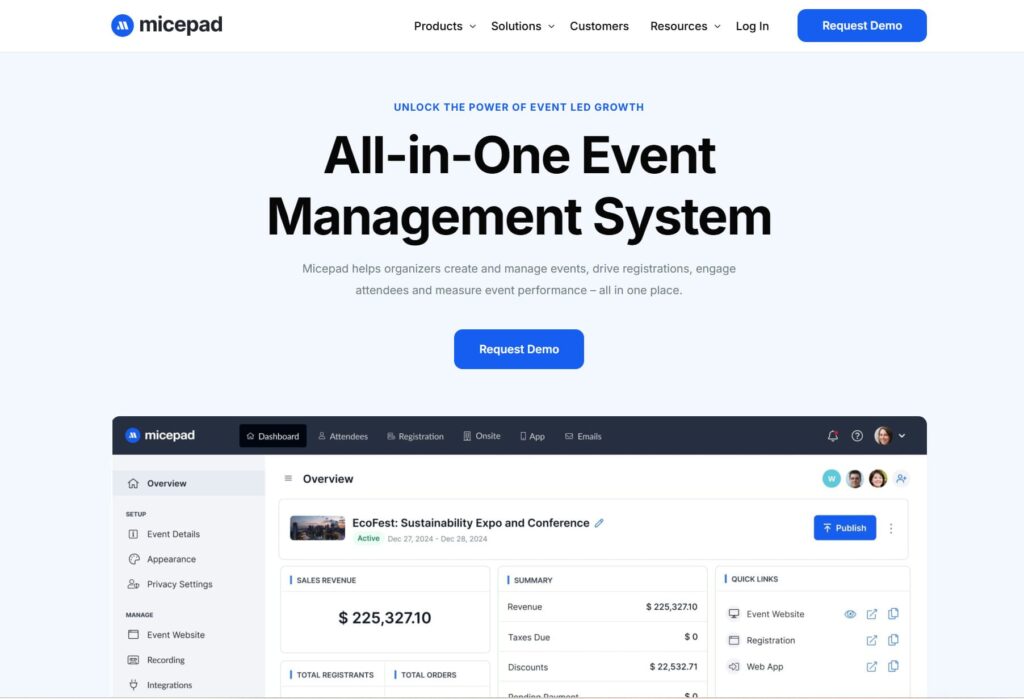
- Overview: Another Singaporean tech success story, Micepad provides a highly interactive and user-friendly event app that has evolved into a full-service hybrid event solution.
- Specialty: Interactive Event Apps, Hybrid Event Management, Gamification, and Live Q&A/Polling.
- Why They Stand Out: A focus on attendee engagement and networking (both virtual and in-person).
EventX
- Overview: A leading event tech company in Asia with a strong Singapore presence. They offer robust solutions for virtual and hybrid events, particularly for the trade show and MICE sectors.
- Specialty: Virtual Trade Shows, Hybrid MICE events, and AI-powered networking matchmaking.
- Why They Stand Out: Strong focus on the Asian market and data analytics for lead generation.
Unearthed Productions
- Overview: A renowned creative events agency that consistently wins awards for its work. They are known for their strong storytelling and emotive, theatrical productions.
- Specialty: Gala Dinners, Award Ceremonies, Luxury Events, and high-impact corporate functions.
- Why They Stand Out: Exceptional creative direction and production quality.
Chab Events
- Overview: A global agency with a very strong Singapore office, Chab specializes in creating extraordinary events for luxury brands and corporate clients, including high-end incentive travel.
- Specialty: Luxury Brand Launches, Incentive Trips (DMC services), and high-end B2C activations.
- Why They Stand Out: A global network, deep expertise in the luxury sector, and in-house travel management.
The MICE People
- Overview: A well-established agency known for its reliable and comprehensive event management services, with a strong portfolio in both corporate and incentive events.
- Specialty: Corporate Meetings, Incentive Travel, and Gala Dinners.
- Why They Stand Out: A long-standing reputation for dependability and flawless execution.
Encore (formerly PSAV)
- Overview: A global leader in event technology and production services. You will find them as the in-house AV partner for many of Singapore’s largest luxury hotels (e.g., Marina Bay Sands).
- Specialty: High-End AV, Staging, Lighting, and complex technical production for hybrid events.
- Why They Stand Out: Unmatched inventory of high-end gear and a massive, highly-trained technical workforce.
Dorier Asia
- Overview: Part of the global Dorier group, this agency is a premium provider of audio-visual solutions and technical production. They are known for handling complex, large-scale conference and broadcast set-ups.
- Specialty: Technical Concept & Design, Large-Screen Displays, and Broadcast-quality production.
- Why They Stand Out: A Swiss-heritage focus on precision and high-quality engineering.
SingEx (Now part of ATEO)
- Overview: While historically known as the venue manager for Singapore EXPO, SingEx has deep expertise in exhibition and trade show management. They are now part of ATEO, a joint venture with Temasek.
- Specialty: Trade Show Management, Exhibition Services, and Venue Operations.
- Why They Stand Out: Unparalleled experience in managing Singapore’s largest exhibition venue.
See More: Save $1000 Instantly: The Smart Way to Choose Your Corporate Event Planner in Singapore
Key Trends & Compliance in the Singapore Event Market
Choosing an agency also means choosing a partner who is future-ready. A top agency should be advising you on these trends, not learning about them from you.
Key Trends
- The Sustainability Mandate: Singapore is aggressively pushing its Green Plan 2030. Events are a major focus. This includes reducing single-use plastics, managing food waste (catering), using sustainable fabrication materials, and carbon offsetting. Ask your agency for their sustainability plan for your event.
- Intelligent Hybrid Models: Hybrid is no longer a static webcam. It’s about creating two distinct, high-value experiences—one in-person, one virtual—that are interconnected. This requires broadcast-quality production and a platform that fosters true virtual engagement.
- Data-Driven Personalization: “Event tech” is now “event data.” Top agencies use technology (like RFID, event apps, and registration data) to track the attendee journey, personalize schedules, and provide you with a rich data report on engagement and ROI.
- Immersive Tech Integration: AR, VR, and interactive displays are no longer gimmicks. They are being integrated to create “phygital” (physical + digital) experiences, allowing attendees to interact with products in new ways or bringing virtual attendees “into the room.”
Compliance & Legalities: The Singaporean “Safety Net”
An agency’s local expertise is critical for navigating Singapore’s strict regulatory environment. They must manage:
- Public Entertainment Licence (PEL): Required from the Singapore Police Force (SPF) for most events with music or performances.
- SFA Licences: The Singapore Food Agency (SFA) has strict rules for any event serving food and beverages.
- Copyright Licences (COMPASS): You must have a licence to play copyrighted music, even as background.
- Safety & Risk Assessment: A comprehensive Risk Assessment Management Plan (RAMP) is mandatory for large events.
A good agency bakes all this into their project plan, ensuring your event is not just successful, but also safe and fully compliant.
See More: How Much Does It Cost to Hire an Event Management Company in Singapore?
8 High-Knowledge Event Management FAQs
As promised, here are 8 expert-level FAQs that focus on event knowledge, not services.
1. What is the actual difference between an event manager and an event planner?
While often used interchangeably, there’s a key strategic difference. An Event Planner typically focuses on the “planning” and “coordinating” elements before the event: selecting themes, booking venues, and arranging vendors. An Event Manager has a broader, more operational scope. They manage the entire project lifecycle, including on-site execution (show-running), staff management, technical production, and post-event analysis. A full-service agency does both.
2. How is Event ROI (Return on Investment) professionally measured?
ROI calculation depends on the event’s goals. It is a formula: ((Total Event Value – Total Event Cost) / Total Event Cost) * 100. The “Total Event Cost” is easy, but “Total Event Value” is harder. It’s measured by:
- For B2B/Sales Events: Value of Sales Pipeline Generated + Value of Closed Deals.
- For Brand Awareness Events: Media Impressions Value + Social Media Engagement Value.
- For Internal Events: Measured via Employee Retention Rates and Post-Event Skill Assessment Scores.
3. What truly defines a “hybrid event” in the modern sense?
A true hybrid event is not just a livestream of a physical event. It is a single event with two distinct experiences. It requires a strategy to engage the virtual audience as first-class participants, often with a dedicated virtual MC, virtual-only networking sessions, and interactive features (polls, Q&A) that feed into the live room, and vice-versa.
4. What is “gamification” in the context of a corporate conference?
Gamification is the use of game-design elements (like points, badges, and leaderboards) in a non-game context to drive engagement. In a conference, this could be:
- Assigning points to attendees for visiting sponsor booths (tracked via an app or RFID).
- Creating a “leaderboard” for the most active participants in Q&A sessions.
- Awarding badges for completing networking “quests” (e.g., “Meet 5 people from a different industry”).
5. What is the role of “Event Tech” beyond just registration?
Registration is just the gateway. Today’s “Event Tech stack” is the event’s central nervous system. It includes:
- Engagement: Event apps for networking, polling, and personalized agendas.
- Data & Analytics: RFID/NFC beacons to track attendee flow and “heat maps” of a trade show floor.
- Networking: AI-powered matchmaking that suggests “who you should meet” based on profile data.
- Production: Platforms that manage complex video feeds for hybrid formats.
6. What does “sustainability” (Green MICE) mean in practice for an event?
In practice, it means making deliberate choices to reduce an event’s environmental footprint. Key actions include: (1) Venue: Choosing a venue with a Green Mark certification. (2) Waste: Eliminating single-use plastics and creating clear recycling/composting streams. (3) F&B: Sourcing local, seasonal food and having a plan to donate surplus. (4) Materials: Designing booths and signage for reuse, not disposal. (5) Carbon: Offsetting the carbon footprint of delegate travel.
7. What is a “Run of Show” (ROS) and why is it so critical?
The Run of Show (or “show flow”) is the event’s master script. It is a hyper-detailed document, broken down by the minute (or even second), that outlines exactly what is happening at any given moment. It details:
- Timing: The exact time each segment starts and ends.
- Action: What is happening on stage (e.g., “CEO walks on stage”).
- AV Cues: What is on the screen (e.g., “Play CEO walk-on video”), what music is playing (“Cue walk-on track”), and what the lighting is (“Follow-spot on CEO”).
- Who: Which speaker, MC, or staff member is responsible.
It is the single source of truth for the entire technical and production team.
8. What is the primary strategic difference between a B2B and a B2C event?
The core difference is the objective and audience mindset.
- B2C (Business-to-Consumer) Events are about brand love and emotion. The goal is to build brand awareness and create a memorable, emotional connection (e.g., a product launch, a festival). The strategy is sensory-driven, visual, and focused on “shareability” (social media).
- B2B (Business-to-Business) Events are about value and logic. The goal is education, lead generation, and networking (e.g., a conference, a trade show). The strategy is content-driven, focusing on thought leadership, proving ROI for attendees, and facilitating high-quality connections.
See More: Top Event Management Companies in Singapore for 2025: Who Delivers the Best Experience?
Conclusion: Making Your Choice
The Singapore event industry is one of the most professional, creative, and technically advanced in the world. The companies on this list represent the best of what the nation has to offer.
Your choice of partner is one of the most critical decisions you will make. It will directly impact your budget, your brand’s reputation, and ultimately, the achievement of your business goals.
Do not choose based on a list alone. Use the 8-point “Golden Criteria” framework. Conduct a formal Request for Proposal (RFP). Meet the teams. Challenge their creative and strategic thinking.
By investing the time to find a true partner—not just a supplier—you will unlock the full potential of Singapore as a world-class event destination and deliver an experience that resonates long after the last guest has departed.